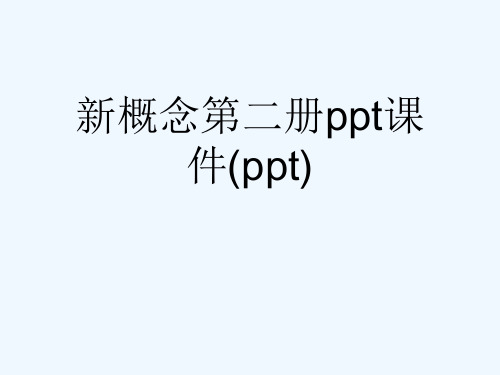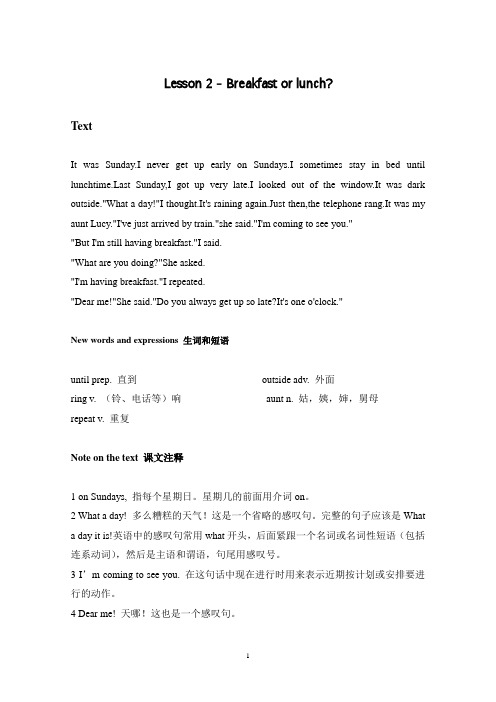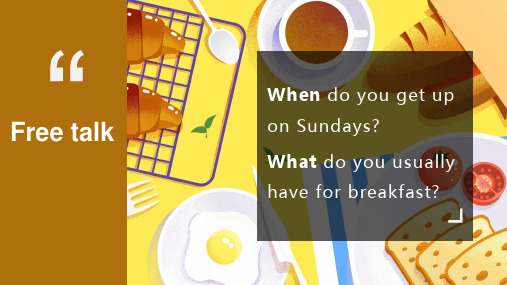新概念2第2课课件
新概念第二册ppt课件(ppt)

■1. exciting adj.令人兴奋的, 令人激动的,振奋 人心的
这是多么令人兴奋的消息! What an exciting news this is!
That is an exciting book. 这是一本非常扣人心弦的书。
excited adj.(自己)感到兴奋的 We are very excited about this news.
-ed自己感到 interested, bored, -ing令人感到interesting, boring, I am interested in this book. This is an interesting book.
2.adj. 结实的,稳固的 firm muscles 这部小汽车非常坚固。 The car is very firm.
【补充学习】有关“公司”的表达: firm ;company;business;
■4. different adj.不同的—— same相同的 (1)不同的,相异的: be different from...与…不同 Desks are different from tables. My plan/idea is different from yours. We are planning something different this year.
受建议
• take还表示主动的“拿”、“取” • I received a beautiful pen from my uncle.
新概念英语2第二课 NCE2_Lesson02

★ aunt n. 姑,姨,婶,舅妈
• 所有长一辈的女性都用这个称呼 • 男性则是uncle: 叔叔 • 他们的孩子:cousin 堂兄妹(不分男女) • cousin的孩子:nephew 外甥,侄子
niece 外甥女,侄女
★repeat v. 重复(=Pardon)
① vt. 重复 • 你能重复最后一个词吗? • Will you repeat the last word? • 跟著我念这些句子 • Repeat these sentences after me. ② vi. 重做,重说 • 她只是反覆地做同样的事 • She did nothing but repeated.
1、在肯定句中,它与表示持续性状态的动词连用,表示某动作持续到 某一时刻:
我会在这里等到5点钟。 I’ll wait here until 5. 直到他回来为止,他爸爸都是活着的. His father was alive until he came back. 2、在否定句中,它通常与描述短暂动作的动词连用,“直到……才”: 她到6点才能来。 She cannot arrive until 6. 直到他回来,他爸爸才死. His father didn't die until he came back.
★ring(rang. rung)
① vt. 鸣,(铃、电话等)响(往往是提醒人做某事) • 每天早上表都在六点钟响。 • Every morning the clock rings at 6. • 电话/门铃响了。 • The telephone(door bell) is ringing. ② vt. 打电话给(美语中用call) • 明天我会给你打电话 • Tomorrow I'll ring you. ③ n. (打)电话 give sb. a ring • 记得明天给我打电话 • Remember to give me a ring. /Remember to ring me. ④ n. 戒指 • 他给了她一个钻石戒指作为生日礼物 • He gives her a diamond ring as a birthday present.
新概念第二册第2课课件 (共30张PPT)

Words and Expressions
请用以下单词或词组的正确形式填空 aunt, until, outside, ring, repeat
☺I have a nephew. He calls me _____ . ☺Don’t go ______. It’s too dangerous. ☺The ______ of the house is dirty. ☺There is a lake _____ the school. ☺On weekends, I usually sleep ____ 12 o’clock. ☺Can you ______ this sentence? I didn’t hear you. ☺The mistake is _____ again and again. ☺The door bell is _____. Go and have a look!
repeat repeat (v.) – repetition (n.) vt. / vi. / n. 重复;复述
☺ Could you repeat what you said just now? ☺ 你能复述一下你刚才说的东西吗? ☺ 延伸:what you said 你说的东西,what you did 你做的东西 ☺ what you wrote 你写的东西,what you like 你喜欢的东西 ☺ 别重复犯同样的错误,好吗? ☺ Don’t repeat the same mistakes, OK? • Will you repeat the last word? • 你能重复一下最后一句话么?
Let’s listen to the tape again and fill in the blanks
新概念英语第2册课程讲义Lesson2

Lesson2单词讲解1.until prep.直到until nowuntil lunchtime2.outside adv.外面insideupside down3.ring v.(铃,电话等)响ring rang rungsing sang sungdrink drank drunkswim swam swumbegin began begunring n.4.repeat v.重复re-retellrewriterediscoverRebroadcastLesson2课文&语法讲解一般现在时现在进行时感叹句一般现在时现在进行时时态?如何体现?一共多少种?一般现在时谓语v.=原形/第三人称单数(do/does)I tell you a secret.He tells you a secret.Your friend tells you a secret.一般现在时谓语v.=原形/第三人称单数(do/does)用法1:表示现在经常性习惯性的动作We have the English class every day.He often gets up late.always,usually,often,sometimes,never…一般现在时谓语v.=原形/第三人称单数(do/does)用法2:表示现在的状态I am a teacher.We are happy together.一般现在时谓语v.=原形/第三人称单数(do/does)用法3:表示永恒The earth is round.The earth moves around the sun.Practice makes perfect.一般现在时变否定/疑问现在进行时谓语v.=am/is/are+doing用法1:表示现在正在进行的事We are studying English now.J.K.Rowling is writing another book this year.现在进行时谓语v.=am/is/are+doing用法2:表示将来确定要发生的事I am coming to see you.We are arriving at....The old man is dying.现在进行时变否定/疑问He is listening.He is not listening.Is he listening?What is he doing?1.It was Sunday.2.I never get up early on Sundays.3.I sometimes stay in bed until lunchtime.4.I looked out of the window.5.It was dark outside.6.'What a day!'I thought.感叹句:What+n./n.词组!How+adj./adv.! What a wonderful world!How interesting!7.'It's raining again.’8.Just then,the telephone rang.9.It was my aunt Lucy.10.'I've just arrived by train,'she said.11.'I'm coming to see you.’12.'But I'm still having breakfast,'I said.13.'What are you doing?'she asked.14.'I'm having breakfast,'I repeated.15.'Dear me,'she said.16.'Do you always get up so late?17.It's one o'clock!'Lesson2知识拓展本课重点:一般现在时do/does 现在进行时am/is/are+doing一般现在时/现在进行时Right now I’m in class.I(sit)_______________at my desk.I usually(sit)_______________at the same desk in class every day.一般现在时/现在进行时Right now I’m in class.I am sitting at my desk.I usually sit at the same desk in class every day.一般现在时/现在进行时Ali(speak)_______________Arabic.Arabic is his native language,but right now he(speak)_______________English.一般现在时/现在进行时Ali speaks Arabic.Arabic is his native language,but right now he is speaking English.一般现在时/现在进行时A:(it,rain)_______________a lot in southern California?B:No.The weather(be)_______________usually warm and sunny.一般现在时/现在进行时A:Does it rain a lot in southern California?B:No.The weather is usually warm and sunny.一般现在时/现在进行时A:I’ll take those-the yellow flowers.B:Here you are,mister.Are they for a special occasion?A:I(buy)_______________them for my wife.I(buy)_______________her flowers on the first day of every month.一般现在时/现在进行时A:I’ll take those-the yellow flowers.B:Here you are,mister.Are they for a special occasion?A:I am buying them for my wife.I buy her flowers on the first day of every month.本课重点:一般现在时do/does 现在进行时am/is/are+doing。
新概念第二册ppt课件

• 以下短语中名词前不加冠词与加冠词意思有区别 • go to school 去上学; go to the school 去学校; • go to hospital去看病; go to the hospital去医院
3、I did not enjoy it. enjoy vt. 欣赏,享受,喜爱 ① enjoy +n. 喜欢,从当中得到一种享受(后面不能跟人) eg. I enjoy the music. enjoy the dinner\film\game ② enjoy oneself/代词 玩的开心 eg. We always enjoy ourselves. ③ enjoy +动名词 eg. Jane doesn’t enjoy swimming.
【课文讲解】
1、Last week I went to the theatre. • go to the +地点 表示去某地干什么事 • go to the theatre = go to the theatre to see a play去剧 场看戏 • go to the cinema =see a film 去电影院看电影
+ to sb. \ sth.
★business n. 事, 生意 • ① n. 生意 • businessman 生意人 • businesswoman • do business: 做生意 • go to some place on business:因公出差 eg. I went to Tianjin on business.
新概念英语第二册第02课

Lesson 2 - Breakfast or lunch?TextIt was Sunday.I never get up early on Sundays.I sometimes stay in bed until st Sunday,I got up very late.I looked out of the window.It was dark outside."What a day!"I thought.It's raining again.Just then,the telephone rang.It was my aunt Lucy."I've just arrived by train."she said."I'm coming to see you.""But I'm still having breakfast."I said."What are you doing?"She asked."I'm having breakfast."I repeated."Dear me!"She said."Do you always get up so late?It's one o'clock."New words and expressions 生词和短语until prep. 直到outside adv. 外面ring v. (铃、电话等)响aunt n. 姑,姨,婶,舅母repeat v. 重复Note on the text 课文注释1 on Sundays, 指每个星期日。
星期几的前面用介词on。
2 What a day! 多么糟糕的天气!这是一个省略的感叹句。
完整的句子应该是Whata day it is!英语中的感叹句常用what开头,后面紧跟一个名词或名词性短语(包括连系动词),然后是主语和谓语,句尾用感叹号。
新概念第二册ppt课件

• 5 ---地点状语,一般在方式副词之后,时间副词之前
• 6 ---时间状语,可以放在句首或句末
• 简单陈述句一定不能少的是主语, 谓语.
• 如果问何时何地,是一个固定搭配 when and where
2021/7/31
Exercises
• Put the phrases in to correct order
2021/7/31
★ pay vt. &vi. 支付
① vt. &vi. 支付(价款等) eg. Have you paid the taxi-driver?
★ pay…for sth. 花/支付……(钱)买……
eg. I paid 50 dollars for this skirt.
2021/7/31
2021/7/31
直到
• until用于表示动作、状态等的持续,可译为“一直到……为止”或 “在……以前”。
• His father was alive until he came back. 直到他回来为止,他爸爸 都是活着的.
• His father didn‘t die until he came back. 直到他回来,他爸爸才死
adv. 外面
• ring (rang, rung) v.
(铃、电话等)响
• aunt
n. 姑,姨,婶,舅母
• repeat
v. 重复
2021/7/31
【课文讲解】
2、I never get up early on Sundays. • on Sundays: 所有的星期天,每逢星期天,与一般现在时连用,表示经常性
adj. 私人的 n. 谈话 n. 剧场,戏院 n. 座位 n. 戏 adv. 大声地 adj. 生气的 adv. 生气地 n. 注意 v. 容忍 n. 事 adv. 无礼地,粗鲁地
新概念2Lesson2-(共27张PPT)-精品课件可修改全文

★until prep.直到;直到...才; 直到...为止 后面加(时间状语)从句,前面就是主句 His father didn't die until he came back. 直到他回来,他爸爸才死. 2) His father was alive until he came back. 直到他回来为止,他爸爸都是活着的. eg:For he___until it stopped raining. A.waited B.didn't wait A.leave. B.left C.didn't leave
1. busy man he is! the man is ! 2. happy baby it is ! the baby is !
阿瑟·柯南·道尔(Arthur Conan Doyle )世界著名小说家,堪称侦探悬疑小说的鼻祖。因成功的塑造了侦探人物――福尔摩斯,而成为侦探小说历史上最重要的小说家之一。除此之外他还曾写过多部其他类型的小说,如科幻、悬疑、 历史小说、爱情小说、戏剧、诗歌等。
温斯顿·丘吉尔(Winston Leonard Spencer Churchill ),政治家、画家、演说家、作者以及记者,1953年诺贝尔文学奖得主(获奖作品《第二次世界大战回忆》),曾于1940-1945年及1951-1955年期间两度任英国首相,被认为是20世纪最重要的政治领袖之一,带领英国获得第二次世界大战的胜利。据传为历史上掌握英语单词词汇量最多的人之一(十二万多)。被美国杂志《展示》列为近百年来世界最有说服力的八大演说家之一。2002年,BBC举行了一个名为“最伟大的100名英国人”的调查,结果丘吉尔获选为有史以来最伟大的英国人。
新概念第二册第二课课文讲解

Lesson 2 Breakfast or lunch?早餐还是午餐?【Text】It was Sunday. I never get up early on Sundays. I sometimes stay in bed until lunchtime. Last Sunday I got up very late. I looked out of the window. It was dark outside. ’What a day!’ I thought. ’It’s raining again.’ Just then, the telephone rang. It was my aunt Lucy. ’I’ve javain,’ she said. ’I’m coming to see you.’’But I’m still having breakfast,’ I said.’What are you doing?’ she asked.’I’m having breakfast,’ I repeated.’Dear me,’ she said. ’Do you always get up so late? It’s one o’clock!’【New words and expressions】生词和短语★until prep.直到直到...才;直到...为止后面加(时间状语)从句,前面就是主句1) His father didn’t die until he came back. (肯定)直到他回来,他爸爸才死.2) His father was alive until he came back. (否定)直到他回来为止,他爸爸都是活着的.到他回来这一点之前,没死: not die;活的:不加not.把until作为时间终止线从句的时间终点之前,这个动作做了还是没做?做了——肯定; 没做——否定.he _____(wait) until it stopped raining.A. waitedB.didn’t waitA.leaveB.leftC.didn’t leaveI stay in bed until twelve o’clock.I didn’t get up until 12 o’clock.A(C)_★outside adv.外面作状语He is waiting for me outside.It is cold outsid.★ring (rang.rung) v.(铃、电话等)响(刺耳的)[注]这种响是刺耳的,往往是提醒人做某事The telephone(door bell) is ringing.Every morning the clock rings at 6. 这钟每天早上6点响。
新概念英语第二册--第2课

get up early
got up very late
dark outside
look out of the window
raining
7 'What a day!' I thought.
8 'It's raininFra bibliotek again.‘
9 Just then, the telephone rang. just then 就在那时 = just at that time/moment
10 It was my aunt Lucy.'
11 I've just arrived by train,' she said.
What an interesting play it is !
What a nice bag it is!
结构
How adj/adv +主谓! What a/an +adj +可n单+主谓!
What adj +可n复+主谓! What +adj+不可n!
1 It was Sunday. 2 I never get up early on Sundays.
He is waiting for me outside.
他正在外面等我。
3. ring---rang---rung v.(铃、电话等)响 v. ⑴ The telephone is ringing.电话响了。
⑵ ring sb. (up) = call sb. (up ) 给某人打电话
新概念第二册课PPT课件

People who go to a formal Western dinner party for the first time may be surprised by table manners in Western culture. Knowing them will help you make a good impression. Having good table manners means knowing, for example, how to use knives and forks, when to drink a toast and to behave at the table. Beside your napkin you will find a small bread roll and three glasses—one for the white wine, one for the red wine, and one for the water. There are two pairs of knives and forks on the table, forks on the left and knives on the right of the plate. When you see two spoons, the big one is for the soup and the small one for the dessert. When you sit down at the table, you can take your napkin, unfold it and put it on lap.
Discuss: Which of the following behaviors are polite or impolite at a Western dinner party. Write “P”(polite) or “I”(impolite) in brackets.
新概念英语第二册课课件 Lesson

•A public house which was recently bought by Mr. Ian Thompson is up for sale.
•a public house 酒吧、酒店,口语缩略为pub •up for sale 有待出售,供出售 •be up for 有待于…,为了某一目的 •This problem is up for discussion. •这个问题有待于讨论。 •on sale 打折卖 for sale 待售;出售
• ★shake(shook,shaken) v. 摇动 • vt.&vi. 摇,摇动,抖动 • Mr. Thompson shook his head. • His hands appear to be shaking. • 他的手看上去在发抖。 • ② vt. 同…握手 • Dan shook hands with him.
A public house which was recently bought by Mr. Ian Thompson is up for sale. Mr.Thompson is going to sell coming from the bar. The next morning, he found that the doors had been blocked by chairs and the furniture had been moved. Though Mr.Thompson had turned the lights off before he went to bed, they were on in the morning.He also said that he had found five empty whisky bottles which the ghost must have drunk the night before. When I suggested that some villagers must have come in for a free drink, Mr.Thompson shook his head. The villagers have told him that they will not accept the pub even if he gives it away.
新概念第二册第2课breakfast or lunch

What a day!感叹句
What + a/an + adj. + n.+ (主+谓) What + adj. + 可数名词复数/不可数名词+(主+谓)
这是一副多么漂亮的图画啊! 多么好的天气啊! How + adj./adv. + 主 + 谓 男孩跑得多么快啊!
感叹句可以用What引导,也可以用 How引导。
in bed 卧床(生病或睡觉) in the bed 在床上
表示交通方式,by +交通工具,不加冠词 by train by bus by plane/by air by ship/by sea/by water by car on foot
强调动作本身,用 take+冠词+交通工具。 take a train take a bus/take a car take a plane take a ship
入门测
4.I've won a holiday for two to Florida.I_____my mum. A.am taking B.have taken C.take D.will have taken 5.If it_____(rain)tomorrow,we'll have to put off our sports meet.
look out of... 向......外面看 look out 小心 look like 看上去像 look up 查字典 look for 寻找 look down upon/on 瞧不起 look over 调查 look forward to +n./doing 盼望
新概念英语第二册Lesson2完整课件

③ n. (打)电话 give sb. a ring 记得打电话给我! Remember to give me a ring.
④ n. 戒指 wedding ring
aunt n. 姑,姨,婶,舅妈 uncle n.叔叔,舅舅,姑父 他们的孩子:cousin[ˈkʌzn] 堂兄妹(不分男女) cousin的孩子:
'Do you always get up so late? It's one o'clock!'
I'm coming to see you. 用 come 的现在进行时态 be coming 表示一般将来,表示 近期按计划或安排要进行的动作。 同样用法的动词有: go,come,leave,arrive… 你马上就要离开吗? Are you leaving at once? 明天他就到了。 He is arriving tomorrow.
repeat v. 重复 不要重复! Don't repeat!
他们正在重复那个有趣的游戏。 They are repeating that interesting game.
Why was the writer's aunt surprised?
It was Sunday. I never get up early on Sundays . I sometimes stay in bed until lunchtime. Last Sunday I got up very late. I looked out of the window. It was dark outside . 'What a day!' I thought. 'It's raining again.' Just then, the telephone rang . It was my aunt Lucy. 'I've just arrived by train,' she saidSu.nd'aI'yms coming to see you.'
新概念英语第二册Lesson2课件

look into 1. 向...里看
look into the box 2. 调查,分析
向盒子里面看
The police are looking into the case. 警察正在调查这个案件。
Look out ! 小心,当心
Look out ! The car nearly knocked you over.
2021/3/11
15
How +形容词 + 主语 + 谓语 How careless she is!
当 What +(a/an)+形容词+人称代词(+be动词时, 两者完全相等 What an interesting story it is! = How interesting the story is! What a clever girl she is! = How clever she is!
11学习交流ppt时间范围较广表示某年某季节某月某周某一天的某段时间year在一年中may在五月march7thmondayafternoon在周一下午march7th2013twooclock在两点moment在这一刻注意
Lesson2 Breakfast or lunch?
a story about a man who doesn't like getting up early on Sundays.
6
eg: He___until it stopped raining. A.waited B.didn't wait A.leave. B.left C.didn't leave
• We stayed until the rain stopped. • 我们一直等到雨停为止。 • We didn’t start until the rain stopped. • 直到雨停了我们才出发。 • 她六点才能来。
- 1、下载文档前请自行甄别文档内容的完整性,平台不提供额外的编辑、内容补充、找答案等附加服务。
- 2、"仅部分预览"的文档,不可在线预览部分如存在完整性等问题,可反馈申请退款(可完整预览的文档不适用该条件!)。
- 3、如文档侵犯您的权益,请联系客服反馈,我们会尽快为您处理(人工客服工作时间:9:00-18:30)。
她穿了一条多么漂亮的裙子啊!
(3)How +adj./adv.+主语+谓语! How foolish he is!他多么愚蠢啊!
感叹句中如何判断How与What的区别?
一、 What引导的感叹句: 1、what + a/an +形容词+单数可数名词+陈 述句(主语+谓语) 1)What a beautiful city it is! 多么美丽的一个城市啊! 2)What an interesting story she has told us! 她告诉我们多么有趣的一个故事啊!
early adj./adv.
The early bird catches the worm.
早起的鸟儿有虫吃。捷足先登。
late
adj./adv. 晚的/晚地 I’m sorry for being late. stay up late 熬夜,醒着,不去睡 lately, recently 最近 Have you been abroad lately? 最近你出国过吗? I bought a new car lately. 最近我买了一辆新车。 lately通常用在现在完成时和一般过去式中。
[感叹句]
1.在what构成的感叹句中,what修饰的中心词是名词, 其结构是: (1)What a/an+(adjsting book(it is)! 这是一本多么有趣的书啊! What a nice boy!多么好的一个男孩啊!
look into 向里看 /调查
Look out! 当心
I looked out of the window.
It was dark outside.
'What a day!' I thought.
'It's raining again.' Just then, the telephone rang. It was my aunt Lucy.
翻译下列句子。
1. 今天星期几? What day (of the week) is it __________________________ today?/What day is today? 2. 彼得每个周六都去游泳俱乐部。 Peter goes to the swimming __________________________ club on Saturdays. 3. 下个星期日我要去看祖父母。 I’ll go to see my grandparents __________________________ next Sunday.
3、'What a day!'
• Grammar--• 感叹句
Exclamatory sentence
感叹句
1、含义:感叹句表示说话时的惊讶、喜悦、赞赏和愤怒等 情绪。 2、感叹句是由what和how引导,其句型结构为 “What/How+感叹部分+主语+谓语!”。 3、What 引导的感叹句 1)What + a (an)+形容词+可数名词单数+主语+谓语! What a beautiful voice she has!她的声音多美啊! 2)What+形容词+可数名词复数+主语+谓语! What kind doctors they are!他们是多好的医生啊! 3)What+形容词+不可数名词+主语+谓语! What good news it is!
on Friday 在星期五
on Friday afternoon 在星期五的下午
注意:当星期名词前有last, this, next (下一个)等词修饰时, 一般不再用介词。 We are going to a movie this Saturday. 这个星期六我们打算去看一部电影。
课堂练习
课文分析:
It was Sunday. I never get up early on Sundays. I sometimes stay in bed until lunchtime. Last Sunday I got up very late.
鼓励某人 Never give up 别放弃。
Never say die. 永不言败。
它们形似而含义不同。请记住下面口诀:
分开是“一段”, 相连为“某时”。
分开s是“倍、次”, 相连s是“有时”。
读读下面四句话, 便会运用这四个词。 例如: (1)I‟ll stay here for some time.我将在这儿呆一段时间。 (2)Kate will be back sometime in February.凯特将在2月某个时 候回来。 (3)Our school is some times larger than theirs.我们学校比他们 学校大几倍。
2、what+形容词+复数可数名词/不可数名词 +陈述句(主语+谓语) 1)What expensive watches they are! 多贵的手表啊! 2)What terrible weather it is! 多么恶劣的天气啊!
二、How引导的感叹句: 1、how+形容词/副词+陈述句(主语+谓语) 1)How cold it is! 多冷啊! 2)How hard he works! 他工作多么努力啊!
sometimes
some times sometime
adv.有时候 some time 一段时间
几次,几倍 将来或过去的某一时间
I will be somebody sometime in the future.将来总有一天我会变成一个大人物。
some time,sometime,some times和 sometimes是常用的几个词,
面how构成的感叹 句的第2种句型除外)。但有时要
辨清不可数名词和可数名词之间的转化。
2.在how构成的感叹句中,how修饰的中心词是形容词或副
词,其结构是:
(1)How+主语+谓语(省略了形容词或副词)! How he is running!他跑得多快啊! (2)How +adj.+a/an+可数名词单数+主语+谓语! How beautiful a dress she is wearing!
4、How 引导的感叹句
①How+形容词+主语+谓语! How clever you are! ②How+副词+主语+谓语! How well she dances!
5、“What + a (an) +形容词+可数名词单数+主语+谓语!” 句型可转换为“How+形容词 +主语+谓语!”句型。 What a clever boy he is! How clever the boy is!
(2)What +(adj.)+可数名词复数+(主语+谓语)!
What lovely children they are!多么可爱的孩子们啊!
(3)What+(adj.)+不可数名词+(主语+谓语)!
What fine weather (it is)!多好的天气啊! 在解题时,要认准句子主语前面是否有名词,如 果有可 数名词单数,感叹句就要用what a/an;有 可数名词复数或不可数名词,就要用what(注意:下
我要呆在这儿一直到他回来。
stay until I’ll ____here _____he comes back.
直到他回来我才会走。
won’t until I ____leave _____he comes back.
A: After the mother came back, the boy went to bed. didn’t go to bed ______ until B: The boy ______ his mother came back. A: Uncle Wang finished his work. He went home. B: Uncle Wang didn’t ____ go home until ___ he finished his work. A 1. They didn’t start the work ____ their teacher came back. A. until B. while C. as soon as D. if C 2、Go down the street ____ you see the third crossing. A. though B. since C. until D. while B 3. Mother didn’t go to bed ____ she finished cleaning the room. A. after B. until C. because D. while
②主句谓语动词为非延续性动词时,应用
not„until„(直到„才„)
She did not come back until this morning.
直到你回来我才会离开。
until won’t I ______leave ____you come back.
他一直等到孩子们睡着。
waits until He _______the children are asleep.
(4)Joan goes to school on foot,but sometimes by bike.琼步行 上学,但有时也骑自行车去。
1、I never get up early on Sundays.
复数用法: 星期名词后面加上“s”,通常指“每个星期 几”,用于一般现在时态中,说明经常性的动作 或状态。如: She helps her mother do housework on Sundays. 每个星期日她都帮妈妈做家务。 表示“在星期几”、“星期几的上午/下午/ 晚上”,介词都用on。如:
